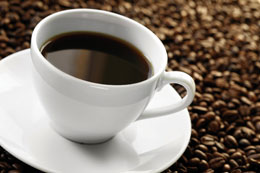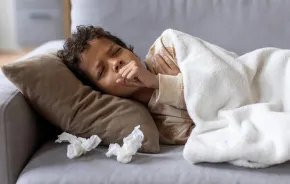“I don’t drink coffee that much — only every school morning to help me wake up.” Roosevelt High School sophomore Zoe Geiger likes that coffee “in a cup with some milk and sugar” — simple, perhaps, by Seattle standards. Though Zoe has yet to learn the finer nuances of hydrating with a proper, multi-hyphenated espresso drink, she’s relying on java for the same reasons many adults drink the stuff.
Geiger likes that coffee “in a cup with some milk and sugar” — simple, perhaps, by Seattle standards. Though Zoe has yet to learn the finer nuances of hydrating with a proper, multi-hyphenated espresso drink, she’s relying on java for the same reasons many adults drink the stuff.
Take a look at the nonstop stream of teen activity at your local bakery, doughnut shop and café. Teens are keeping these establishments busy after 2:30 p.m., and sometimes during lunch hours. Zoe is one of the rare teens who drink it at home in the mornings.
Teens: the java junkies
Dan Raiten, a nutrition researcher at the National Institutes of Health, says more children seem to be drinking more coffee, and starting at younger ages. There is limited information on teens who drink coffee, but the American Dietetic Association in 2005 released studies that show a rise in teenage consumption of bottled coffee beverages, such as Starbucks Frappuccinos and Caribou Coolers. And research by the National Coffee Association shows that 18- to 24-year-olds now make up a whopping 37 percent of the coffee market — the fastest-growing java-guzzling niche.
Some folks think coffee drinks have replaced cigarettes as the new, hip status symbol. Others say it’s the access to a gathering place that cafés present to self-aware teens. Regardless, it is true that smoking rates among teens have dropped rapidly across the nation — whether the teen connection is to look cool with a cappuccino or simply to be healthy.
Sandee Harrold Torok, a health-care provider in Michigan who works with teens, often tells parents that they shouldn’t worry if their child is drinking one or two coffees a day. “Caffeine does not stunt growth in teens,” she says, “and may act as an early exercise in self-moderation if they’re safely in a café sipping foamy concoctions with friends.” Torok is quick to point out that parents should be concerned if their child drinks excessive amounts of coffee. Caffeine can leach calcium from growing adolescent bones and lead to osteoporosis in older years. Plus, drinking coffee, tea or pop exclusively instead of milk means kids are not getting enough calcium. On the other, heavier hand, those whole-milk lattes and mochas have fat solids that can contribute to high cholesterol and heart disease later on in life.
So are these drinks safe for teens? Basically yes, but it depends on moderation, moderation, moderation. Teens should consume no more than three caffeinated soft drinks or one caffeinated coffee a day, and they should reduce or eliminate the amount of sweets and fats in these drinks.
‘I’ll have a half-caf’
You can help your teen by explaining that excess caffeine in her diet can cause symptoms similar to hyperactivity. Most kids understand the negative physical aspects of heightened heart rates and sweaty palms. Explain that caffeine is found in chocolate and many caffeinated beverages (sodas, teas, colas and coffee).
Tell your teen to ask for decaf. The caffeine in a 12-ounce cup of coffee will be reduced from 350 milligrams to only 6 mg. If that’s a hardship, your child can start by asking for half regular and half decaf. If it’s peer pressure she is concerned about, tell her she’ll sound like a coffee maniac if she orders a decaf in front of friends with a low-key comment about how she’s already had too much caffeine for the day.
If your child enjoys adding on gobs of flavor and cream to his espresso-laden beverage, the simple fact is he’ll be adding on calories and fat as well. For instance: The 120 calories in a 12-ounce cappuccino made with nonfat milk will be nearly doubled when made with whole milk (200 calories, half of which will be from fat). Add whipped cream, chocolate and put it in a larger glass, and soon he’ll be drinking the equivalent of one-quarter of his daily caloric intake.
Teach your child to limit her intake of these fancy dessert drinks to only one or two a week. If she insists on daily java fixes, she can ask for nonfat milk with no whipped cream so she’s at least getting calcium from the milk.
Parents should also help their teens by establishing a regular sleep cycle for them, and encouraging exercise and a healthy diet instead of the excessive use of coffee as a stimulant. The packed schedules that many teens keep are already wacky, but disrupting a teen’s sleep pattern by having too much caffeine in his or her system could lead to other negative behavior. Better to sip, enjoy and get to sleep earlier, than guzzle and fall asleep in that afternoon class.
Too much caffeine can cause:
- Rapid heartbeat
- Irritability
- Insomnia
- Indigestion
- Nervousness
- Dizziness
- Dehydration from diuresis (need to urinate)
How much is too much?
Health experts agree that 400 to 450 mg. of total caffeine intake per day is safe for adults and children older than 12 years of age. That takes into account caffeine from all sources: coffee, pop, chocolate, tea and others.
Source: International Food Information Council Foundation
Tracy Romoser is a Seattle-based writer and mother of two.









